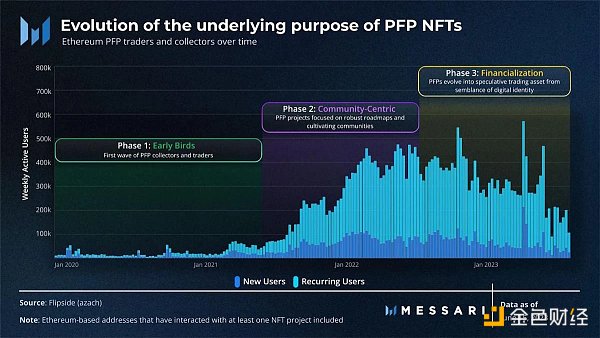Excitement in the NFT Winter Doodles Releases Limited Edition Holed Shoes, Sold Out in 72 Hours
Limited Edition Holed Shoes from NFT Winter Doodles Sold Out in 72 HoursThe encrypted asset market is still in the winter, and NFT, which was booming in the previous bull market, is experiencing its first deep bear market. Countless NFT projects have been cleared out of the market, and players are scrambling to escape. The market has become so bleak that even the most recognized blue-chip NFTs have not been able to escape the continued plummeting. Some projects have started to self-rescue.
Recently, the well-known blue-chip NFT project Doodles collaborated with Crocs to launch a limited edition “holey shoes,” which sold out within 72 hours. Another well-known blue-chip NFT, Pudgy Penguins, combined with physical toys and launched Pudgy Toys. Within two days of its launch on Amazon, sales exceeded 20,000 units, with sales exceeding $500,000.
In the past, NFTs disguised as “new blockchain applications” are now starting to sell products. Although the prices and sales of these products are far from the returns of selling a batch of NFTs in a bull market, these IPs that were originally popular only in the niche Web3 community have finally entered the public eye with the help of physical brands or physical derivatives.
Doodles on Crocs Shoes
Even if you haven’t heard of Doodles NFT, you must know Crocs, the popular casual shoe brand that has been imitated by various knockoff shoes worldwide. Now, Crocs has released a new version of its holey shoes featuring design elements from Doodles NFT.
- Analyzing the potential risks of the TG BOT track from a domestic legal perspective
- Vitalik’s Full Text on the Evolution of Ethereum in Singapore Ten Years of Ethereum and Current Challenges
- Weekly Selection | Market Weakness, TG BOT Track Has a Unique Landscape; MakerDAO Wants to ‘Defect’ from Ethereum; Lido Faces Centralization Doubts Again
Yes, this globally renowned casual shoe brand has crossed over with NFT IPs. They have collaborated with Doodles to launch a limited edition of holey shoes, and buyers will also receive a unique Crocs Box digital collectible. If the buyer destroys this collectible, they can unlock two wearable NFTs that are compatible with Doodles NFT image, as well as a Stoodio Beta LianGuaiss card that can be used in the dynamic Doodles 2 NFT series.
Doodles appearing on limited edition Crocs shoes
The shoes were launched for sale at 12:00 PM Eastern Time on August 29th for $120. Three days later, they were sold out.
Now, let’s learn about this NFT IP that has attracted international shoe brand collaborations.
The Doodles NFT series was launched on October 17, 2021, created by three Canadian artists. In the NFT market, it was considered a peak presence upon its release.
At that time, a total of 10,000 NFTs were available, with only 504 owned by the founding team. The remaining NFTs could be minted by users on the Ethereum blockchain by paying transaction fees. The initial minting price (equivalent to the public offering price) was 0.123 ETH (excluding fees), which was about $471. It sold out quickly and even raised the minting fees to 1 ETH ($3,830).
Doodles is one of the most popular series in the NFT market
It is worth knowing that the NFT market at that time was in a period of explosion. “Bored Ape” and “CryptoPunks” were the biggest winners that brought the NFT concept to life. These two NFT series have their own unique designs – one with a gloomy and bizarre style, and the other pioneering the pixel art movement.
The vibrant colors and simple doodle designs brought a wave of fresh and soft aesthetics to the NFT market. As soon as they were launched, they became one of the “most popular” series in the NFT market. The rarest Doodles NFT was sold for a highest price of 296.69 ETH, which was over 1.1 million US dollars at the time.
However, even the most popular NFTs could not withstand the “crypto winter”. The current starting price for Doodles is only 1.37 NFT, equivalent to 2,220 US dollars, with a 24-hour trading volume of only 33.51 ETH. Although this starting price is more than 4 times the initial price, during its peak period, the starting price was 23.95 ETH, with a daily trading volume of 2,811 ETH.
The price of Doodles has dropped, but the trading volume has not increased. Fortunately, the IP value built over two years of operation is not immediately wasted. The beautiful designs have caught the attention of Crocs, who turned them into shoes. They are sold at 120 US dollars per pair, much lower than the original sale price of 471 US dollars for Doodles back then.
The founding team of Doodles also understands one thing: NFTs cannot rely solely on selling virtual images. The founder, Keast, stated that the ultimate goal of Doodles is to become a comprehensive Web3 entertainment company, aiming to “bridge the gap between Web3 and the real world”. In other words, NFTs can only go so far in the virtual world and must also be pragmatic.
The Deep Bear Driving the NFT Industry from Virtual to Real
Doodles is not the only NFT IP that sells products. Another blue-chip NFT project, “Pudgy Penguins,” has been researching peripherals since May this year. They released a line of blockchain technology integrated with physical toys called Pudgy Toys, and launched the NFT digital platform, Pudgy Worlds, where each toy can be digitally experienced.
According to official introductions, buyers of Pudgy Toys will receive a “birth certificate” to unlock the first season’s feature box of Pudgy World, and obtain identity tokens and corresponding NFTs. Users only need an email to register a blockchain wallet and dress up their own penguins on the website.
According to Amazon data, Pudgy Toys sold over 20,000 units and generated sales of over 500,000 US dollars within two days of its launch, ranking as the top product on Amazon’s new product ranking list. This also demonstrates the recognition of NFT users/ordinary users for the design of Pudgy Penguins.
Pudgy Penguins launches physical toys
The deep bear in the NFT market not only affects individual projects, but even the world’s largest NFT trading platform, Opensea, is struggling. The platform is actively seeking partnerships with platforms or companies that “support e-commerce, ticketing, or any ‘offline’ experiences”.
All signs indicate that the hype around NFTs’ small images has become a thing of the past, and any sector in the industry that goes against this trend may be abandoned by the market.
In June of this year, the blue-chip NFT project Azuki released new artwork. The new series, Azuki Elementals, caused dissatisfaction within the community due to its high similarity to the previous generation of Azuki NFTs. The practice of changing the original image by just giving it a new hairstyle for the new NFT was ridiculed by the community, which once led to the floor price of Azuki dropping below 10 ETH.
Azuki Elementals angered the community and sparked criticism.
NFT heavyweight Christianeth candidly stated on a social platform, “If a team no longer has new ideas, the ability to drive community innovation, or new business models and development directions, it will be difficult in the next cycle.”
Clearly, Doodles and “Pudgy Penguins” have already seen this, and they are trying to find new ways out of the depleted liquidity. They are exploring cross-border marketing and launching physical and digital derivative products, among other attempts. After all, even traditional companies are issuing NFTs, and they have real products. “+NFT” or “+Web3” is just a step towards digitalization.
For example, Starbucks has its NFT membership program, Starbucks Odyssey, Nike has NFT sneakers called Crypto Kicks, and Visa and Mastercard have partnered with different Web3 companies to develop cryptocurrency debit cards, and so on.
Some people are concerned that blue-chip NFTs, busy with cross-border activities, may deviate from innovative exploration of Web3 and fall back on a centralized approach. However, Pudgy Penguins believes that the key issue is how to ensure the rights of NFT holders and “not create side-effects or interfere with market prices.”
Pudgy Penguins has chosen to pass on the revenue from physical toys to NFT holders. They propose a solution: Project OverLianGuaiss, which is essentially an “IP authorization market.”
Although various NFTs are designed and launched by founding teams, the blockchain determines that the ownership of an NFT belongs to the person who spends money to mint it on the chain or buys it from the secondary market later on. When a particular NFT is selected for commercialization, it requires the authorization of the holder. Even if the initiator of a series wants to “sell” an NFT they initiated themselves, they still need authorization from the holder.
Binding the ownership of digital assets directly at the underlying technology level is a unique rule of the blockchain. Project OverLianGuaiss provides a matching market based on this rule: individuals or companies that need authorization can directly list the NFT series they want on this website, and NFT holders can set their own authorization conditions, such as scope of use and compensation. Once a match is made, both parties can complete authorization and being authorized on the chain.
It is reported that Pudgy Penguins has already acquired authorization to produce toys for 16 “Pudgy Penguins.” This is similar to the operation method of “Bored Ape Yacht Club.” This leading NFT project has transferred the commercial use and sales rights of the IP to the holders, who can redesign and recreate these “apes” and can also transfer their ownership rights.
Spanning art, fashion, entertainment, and dining, the boring ape has achieved tremendous commercial success. It is no longer just a JPEG avatar circulating on social media, but an IP ecosystem that has grown from a niche community to a phenomenon-level NFT brand.
Instead of focusing on metrics such as floor price and trading volume all day, the most important thing for NFTs currently is to gain recognition outside the Web3 world, to show how this visual application based on blockchain can transform existing businesses. The integration of NFT IP and physical IP is actually a two-way process of gaining recognition after cross-border marketing, finding new growth points in each other’s target audience.
We will continue to update Blocking; if you have any questions or suggestions, please contact us!
Was this article helpful?
93 out of 132 found this helpful
Related articles
- Understanding Zan, the latest Web3 brand of AntChain, in one article.
- Flashbots Research Report A Beam of Light for MEV, Piercing the Dark Ethereum Night Sky
- Cartridge A new player in the gaming industry, advancing together with infrastructure and game development.
- Interpretation of the ‘Tokenization of Hong Kong Bonds’ Report Using Evergreen ‘Green Bonds’ as an Example, Reviewing the Theory and Practice of Bond Tokenization.
- Blockworks From the Blockchain Impossible Triangle to the Big Convergence
- Beyond Ethereum – Third Generation Blockchain Will Drive Mass Adoption
- MakerDAO chooses Solana as the application chain? It’s too early to draw a conclusion, at least 3 years are needed to achieve it.






